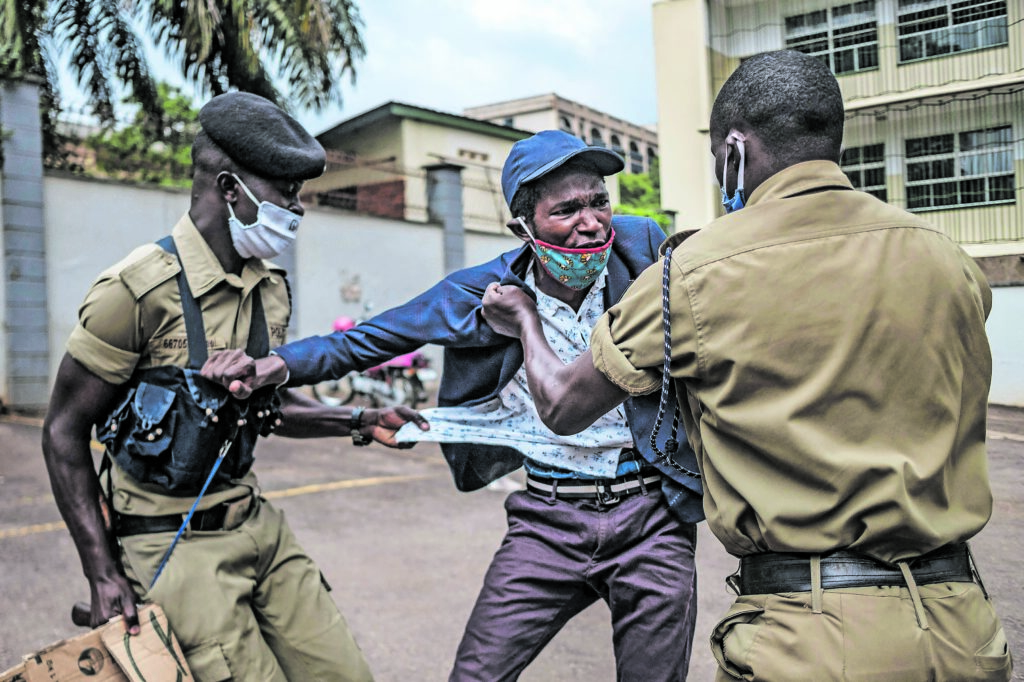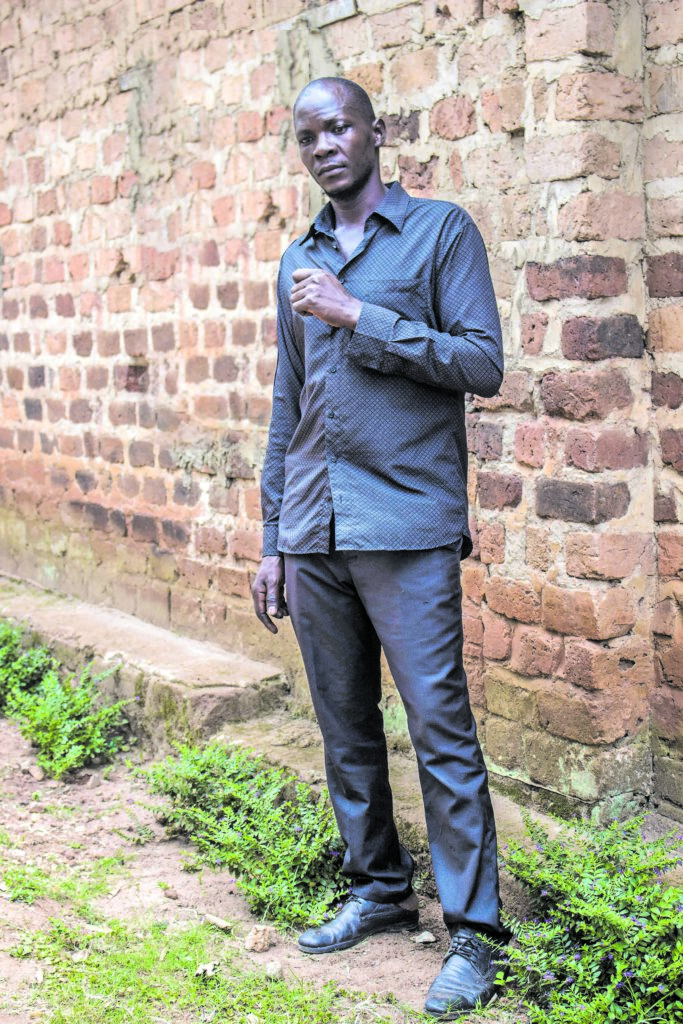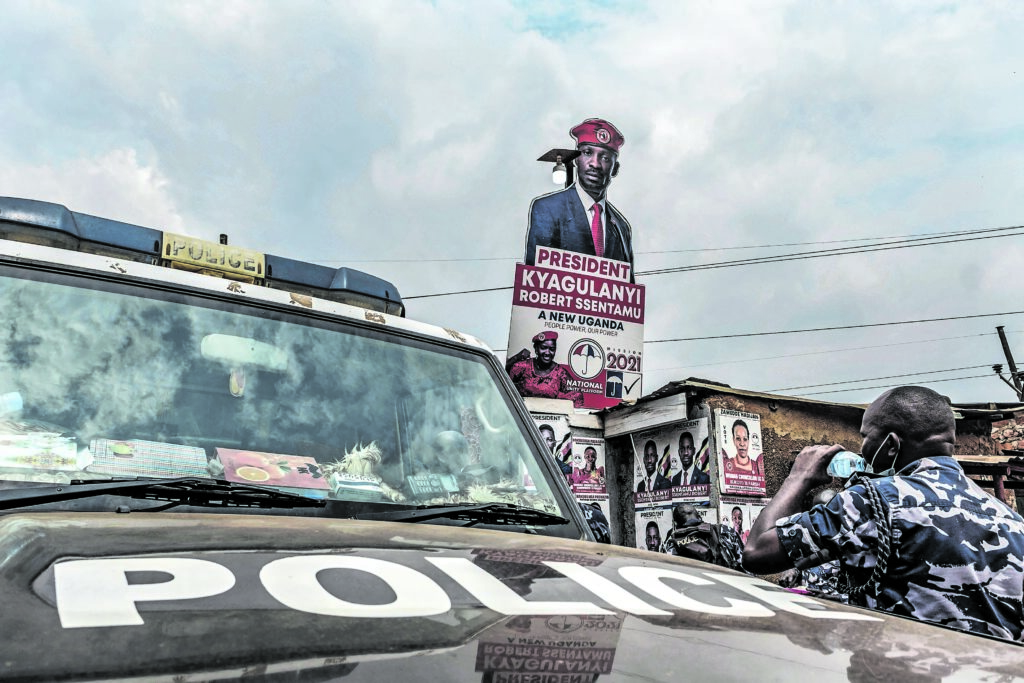Panda gari: Ugandan politician Bobi Wine during a rally in November 2020, before he was arrested. (Photo by Stringer/AFP)
Hundreds of opposition supporters have disappeared in the last few months, allegedly at the hands of Uganda’s increasingly ruthless and unaccountable security forces. Some turn up in court; some turn up tortured or dead; others haven’t turned up at all. For Ugandans who lived through the dictatorship of Idi Amin, these scenes are all too familiar.
Fabian Luuka is slumped on a hospital bed. His leg is shattered. Both his tibia and fibula bones poke through skin. Wounds on his buttocks have rotted and are turning black from severe necrosis.
Luuka said that he had been severely tortured, and his injuries are consistent with this claim.
He was allegedly abducted by state security forces in late February, along with two colleagues, Agodri Azori and Obundu, for the alleged ‘crime’ of possessing a National Unity Platform (NUP) membership card.
They were not the only ones. In the wake of the disputed presidential election in January, hundreds of the party’s supporters — as well as bystanders — have been rounded up by various state security forces. Some have appeared in police prison, some in military detention facilities, and others have not been seen again.
The NUP, led by Kyagulanyi Ssentamu Robert — better known by his stage name, Bobi Wine — is Uganda’s main opposition party. It lost the presidential election in January, according to official results, but Bobi Wine and his colleagues have said the election was rigged.
In an apparent effort to prevent civil unrest in the wake of the disputed vote, Ugandan authorities have launched the most brutal crackdown against the opposition in years
Luuka was caught in the net. After being tortured, he was discarded like litter on the side of the Kampala-Jinja expressway, and rushed to a nearby hospital. It was from there that he narrated his ordeal.
His friends Agodri and Obundu, who were from Luuka’s home village in Arua, died in custody. On 10 March Luuka, too, succumbed to his injuries.
An insider speaks out
Perched on top of one of Kampala’s seven hills is Nakasero Hill, an old colonial suburb that is now home to foreign embassies, the State Lodge and swanky hotels — among them the Serena Hotel, formerly known as Nile Mansions.
It was here that Idi Amin, the brutal dictator who ruled Uganda from 1971 to 1979, founded the State Research Bureau: the infamous intelligence agency responsible for the torture, detention and extrajudicial execution of thousands of Ugandans.
The bureau was shut down when Amin was kicked out of office 1979. But many Ugandans believe that those dark days are returning.
Just a few miles away, in the less conspicuous suburb of Mbuya, is the headquarters of its modern equivalent: the dreaded Chieftancy of Military Intelligence. The name of this government agency is repeated again and again by torture survivors who spoke to the Mail & Guardian.
Opposition leaders, human rights activists and media reports allege that the Chieftancy has played a key role in executing the recent crackdown. So does one insider who spoke to the M&G.
Until recently, Lieutenant Isaac Sankara was the head of the legal department in the directorate of counterterrorism in the Chieftancy of Military Intelligence. But after witnessing abuses committed by fellow officers in Mbuya, he fled the country in January 2020. For his security, the M&G is not disclosing his current location.
“You get overwhelmed” Sankara said. “Some of those people they kidnap and torture would beg, ‘Please, please help me get some treatment. They would even refuse them treatment and in a day or two they die. It hurts.”
“I have seen people tortured from night to morning. Then, for some of the unfortunate abductees, they have the audacity to keep them alive until their wounds heal so they can bring them to court. [President Yoweri] Museveni has made past bad leaders look very good. So good that, if you ask me, ‘Would you rather live under Amin’s regime?’ — I would. My father survived it.”
 A protester is arrested by police officers as Stella Nyanzi (not visible), a prominent Ugandan activist and government critic, organised a protest for more food distribution by the government to people who has been financially struggling by the nationwide lockdown imposed to curb the spread of the Covid-19 coronavirus in Kampala, on May 18, 2020. (Photo by Sumy Sadurni/AFP)
A protester is arrested by police officers as Stella Nyanzi (not visible), a prominent Ugandan activist and government critic, organised a protest for more food distribution by the government to people who has been financially struggling by the nationwide lockdown imposed to curb the spread of the Covid-19 coronavirus in Kampala, on May 18, 2020. (Photo by Sumy Sadurni/AFP)
Sankara fears what will happen if opposition leaders encourage further protests. “I know the determination of a dictator: they are ready to massacre. I pray guys don’t demonstrate. It will be bloody.”
“The purpose of the current abductions is to threaten the supporters of the opposition and send a strong message. If they can arrest Bobi Wine’s chief bodyguard and his best friend, Nubian Li, and keep him in prison for three months, despite all the lawyers that surround Bobi Wine, then, what chance do you have, a common man?”
The drone wars
In late December, on the campaign trail, Bobi Wine was poised to address a rally in Kalangala. But before he could give his speech, soldiers stormed the venue.
Bobi Wine himself was seized and airlifted to his home in Kampala. Forty-nine others were arrested, including his chief bodyguard Eddy Mutwe, and Nubian Li, a famous musician.
Despite being civilians, they were charged in a military court.
Nubian Li’s wife Gloria Mutoni told the M&G: “I pray they release him, since he has no case and no civilian should be brought to military court. They should follow the truth and permit our institutions to work independently.”
Ntege Williams was arrested with Nubian Li and Mutwe. The father of seven remembers being transferred between five prisons before he finally ended up in the Kitalya Maximum Security Prison.
“The food is poor, the sleeping arrangements are the worst — it has an effect on most people. The congestion among prisons was appalling. Covid-19 regulations do not apply,” said Ntege, who is now out on bail. He must report to court every two weeks, and is being treated for a skin disease he contracted in prison.
In the meantime, he has gone into hiding in Kampala — it is too dangerous to be at home. “Anti-drone zifuuse drones,” he said in Luganda. (The drones have become a big problem.)
Minivans with tinted windows, known locally as “drones”, have become a new symbol of oppression. Security forces have developed a reputation for careering around town in the vehicles and snatching opposition supporters off the streets in broad daylight.
“I see the days of panda gari have returned”, says Muhammad Segirinya, a newly elected legislator representing Kawempe North. “Panda gari” is Swahili for “get in the truck”. It was a popular phrase during Idi Amin’s brutal regime, when people were abducted in trucks — many never to be seen again.
Muhammad told the M&G that he now spends much of his time collecting food donations such as rice, matooke, maize flour and much more, for families whose breadwinners are incarcerated in Kitalya.
‘We got him’
 Owen Martin Muwanga barely escaped
Owen Martin Muwanga barely escapedMartin Owen Muwanga, 34, a well-known radio broadcaster and local councillor for the NUP, is all too familiar with the threat from the “drones”.
When the M&G arrived at his home in Kyengera town, west of Kampala, the kids in the compound stopped playing. Muwanga peeped through his living room curtains to ascertain his safety. A motorcycle taxi driver that took us to his house managed to convince him that we had come only to gather news and nothing more.
Having earned his trust, Muwanga recounted his story. It was a normal day at the office, and he was just ending his radio show. His last words on-air were: “We have come to the end of our broadcast, respect the curfew guidelines and let’s meet another day.” As he was packing up to leave, he heard a man’s voice say: “Tumufunye!” (We got him.)
“They didn’t introduce themselves; they had guns. One security official insisted that the radio had been persuading people to participate in a protest” said Muwanga, who denied that was the case.
“They started walking me to the waiting drone, and the commander asked me: ‘Why do you support Kyagulanyi?’” When Muwanga heard these words, he knew he was in trouble. Other colleagues had already been taken in this manner, and could not be traced. Still others had ended up dead.
There was no one else around — he could not call for help. So he decided to make a break for it. “I saw another ‘drone’ arriving. As the van approached, I decided to quickly unravel myself and set myself free from the hands of a distracted officer and dashed into the darkness.”
After his escape, the security forces went to his home: “They hit the doors and broke the glass, demanding an entrance,” said Grace Nakazzi, his wife. But a frantic search yielded nothing.
Police spokesperson Luke Owoyesigire defended the raid on national television, claiming that the arrests took place because Muwanga was asking people to shut down shops to participate in illegal protests.
After Muwanga’s escape from the drone, more than 18 people from his area have been abducted. Among them was Tomusange Ssebugwawo, one of the few who was able to secure his release. The others have not been heard from since, nor have they been produced in court.
 Tomusange Ssebugwawo is among the thousands of opposition supporters who Bobi Wine claims have been detained or abducted, allegedly by security forces. Photo: Stringer/AFP
Tomusange Ssebugwawo is among the thousands of opposition supporters who Bobi Wine claims have been detained or abducted, allegedly by security forces. Photo: Stringer/AFP
Ssebugwawo told the M&G: “People still come to me asking for their missing persons, but I fear to let them know of the outcome as I am sure they are dead.”
Museveni responds
The gruesome images of men and women with terrible injuries being dumped by the side of the road and outside hospital gates eventually became too much for Museveni to ignore.
In an address to the nation on 13 February, he firmly denied that the state is in any way responsible.
“The talk of disappearances should be ignored, because it can’t happen under the [governing party],” he said. “We never cover up: there’s nothing which we do and hide.”
 A patrol car of the Ugandan police is seen stationed outside the headquarters of the Uganda oppposition party National Unity Platform (NUP) on January 20, 2021. – (Photo by Sumi Sadurni/AFP)
A patrol car of the Ugandan police is seen stationed outside the headquarters of the Uganda oppposition party National Unity Platform (NUP) on January 20, 2021. – (Photo by Sumi Sadurni/AFP)
Yet, in the same speech, the president said that a commando unit had arrested 242 suspects, of whom 177 had been granted bail or released.
On 13 March, in another televised address, Museveni said that those missing were in court or had decided to negotiate their way out of prison.
“I would, therefore, want all the others involved in these criminalities to admit their mistakes, co-operate with the security forces, apologise to those who were attacked, so that we go back to normal life, but this should never happen again,” he said.
But few others are buying the president’s denials.
In response to Museveni’s latest speech, NUP president Bobi Wine — who has previously described the president as worse than Idi Amin — released the names of more than 400 people he says have been abducted, most of whom are unaccounted for. He said in February that 3 000 of his supporters have been detained or abducted by security forces.
In Buganda, the powerful kingdom in central Uganda, where Bobi Wine won most of his votes, the region’s prime minister Charles Peter Mayiga was unequivocal.
“Many people have been killed in broad daylight. So many. Others have been knocked by vehicles with intent. Others had guns pointed at them and eventually shot them,” he said.
With the abductions continuing, Mayiga is concerned about what comes next: “A nation can never stabilise when instability prevails. Instability gives birth to more instability, and when instability thrives it sweeps everyone, regardless of their status.”
The abductions have also drawn international attention.
“The recent spate of enforced disappearances has only compounded the intense climate of fear in Uganda following the recent violent national elections,” said Oryem Nyeko, an Africa researcher at Human Rights Watch. “The authorities should urgently investigate these disappearances and other abuses and hold those responsible, including members of security forces, to account.